Ysyakh festival in Yakutia
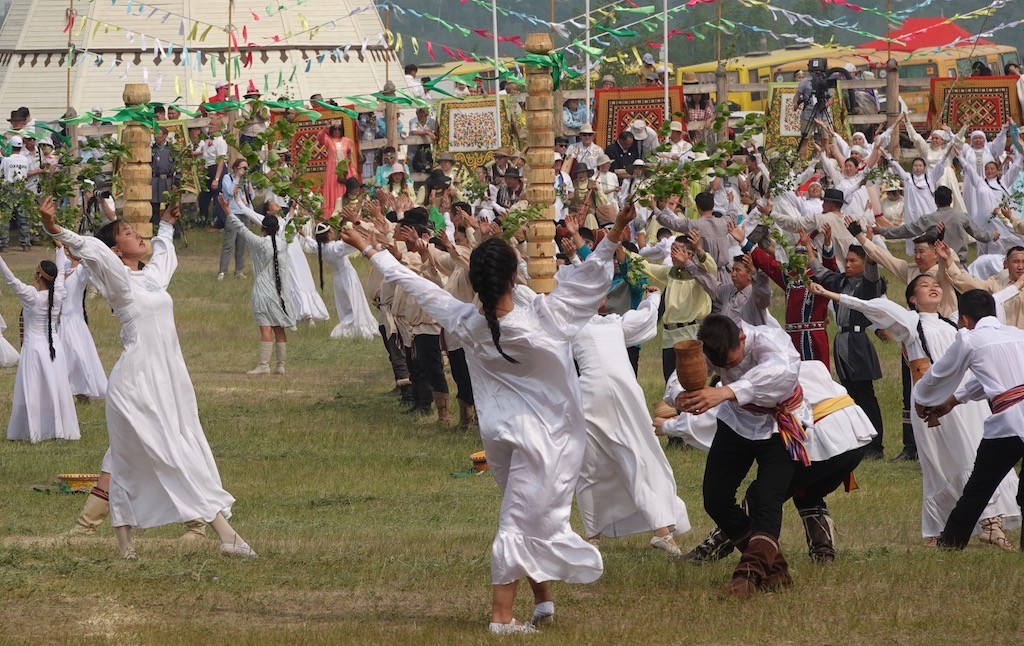
Opening ceremony at Yskyakh festival
When winter lasts nine months and temperatures hit the -70sC, you’d be forgiven for getting a bit over-excited about the arrival of summer. And thus it is with Siberia’s indigenous Yakut people who hail from Yakutia, the coldest inhabited part of the world. In a republic the size of India but with a population of only one million, 300,000 turn up for the annual Ysyakh festival near the capital Yakutsk to celebrate the brief rebirth of nature after the long freeze.
To enter the festival grounds one passes through a passage lined by ladies in traditional Yakut dress who wave horse-hair fly swats at passers by and call out words of blessing.
Why horse hair and why fly swats? Horses are considered sacred by the Yakut people. While many other Siberian indigenous people at these latitudes are reindeer herders, the Yakuts only migrated here 1000 years ago from Lake Baikal in the south, bringing their horses and cows with them. They never domesticated reindeer, and horse herding to this day remains their traditional way of life. The Yakut gods are portrayed riding horses while demons are portrayed riding bulls, the bringers of cold and winter.
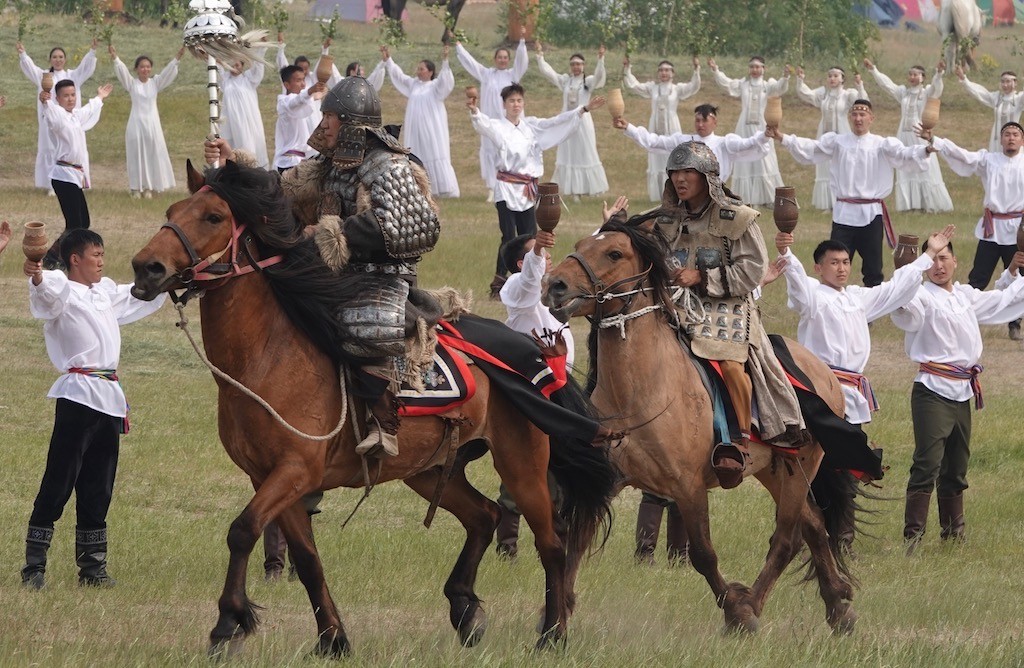
Ysyakh festival opening ceremony
Horse-hair fly swats are considered somewhat sacred and are hung up in many homes to ward off evil spirits. Why did a fly-swat ever become a sacred object? If you had spent a summer in Yakutia, being attacked by mosquitoes, midges and botflies in numbers greater than in any jungle or swamp on the planet, you would understand why.
The only thing worse than winter in Yakutia is summer in Yakutia, a friend once quipped. That is a bit of an exaggeration, as summer is fine if you have good repellent and winter is perfectly comfortable if you have warm clothing, but there is an element of truth there nonetheless.
Today, being right at the beginning of summer, there were thankfully not too many mosquitoes around. The main sources of discomfort were the +31C heat and the ever-present dust. Huge amounts of dust is not something I had ever noticed in Yakutia before but the festival seems to take place in a particularly dusty locale. Shoes, clothing and exposed skin were soon darkening with it. It was a very minor discomfort though, all things considered, and there was so much else going on that the heat and the dust were barely noticeable.
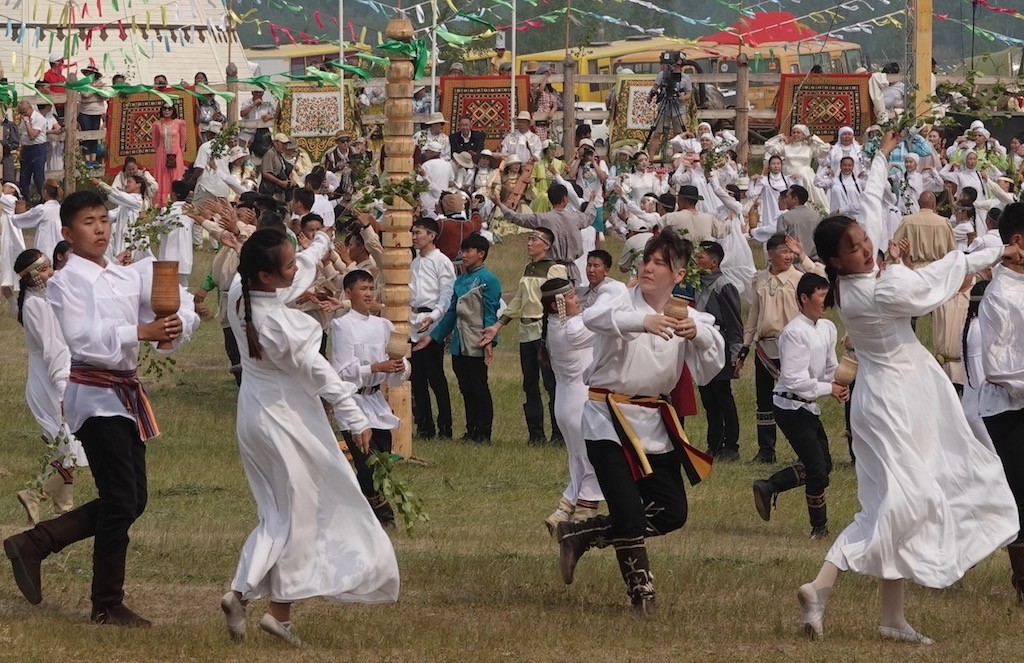
Opening ceremony at Ysyakh festival
After entering the festival grounds you are presented with a handful of horse hair (how many horses did they have to shave to provide this to 300,000 visitors?). You are then blessed and cleansed by another woman with a fly swat and instructed to dip your horse hair in oil then feed it to one of several permanently burning fires nearby as an offering. After walking clockwise around the fire three times you are free to continue on into the festival.
We had aimed to be there in time to watch the opening ceremony, which began at 11:30am. We had set out in our hired car from our rented apartment in Yakutsk at 10:30am, Google Maps assuring us that it would take only 33 minutes to get there, and had arrived just as the opening ceremony was finishing at 12:30pm. Set out early when heading to Ysyakh as there is only one road that leads in the right direction and it is chockablock.
What little we saw of the opening ceremony was quite spectacular though. Hundreds of Yakuts in bright white costumes danced in the sweltering heat, men trying various ceremonious ways to offer kymys (fermented mare’s milk) in chorons (vessels for drinking fermented mare’s milk from) to women who always managed to ignore them, either by dancing on past or raising their outstretched arms and beaming smiles towards the sky in appreciation of the sun.
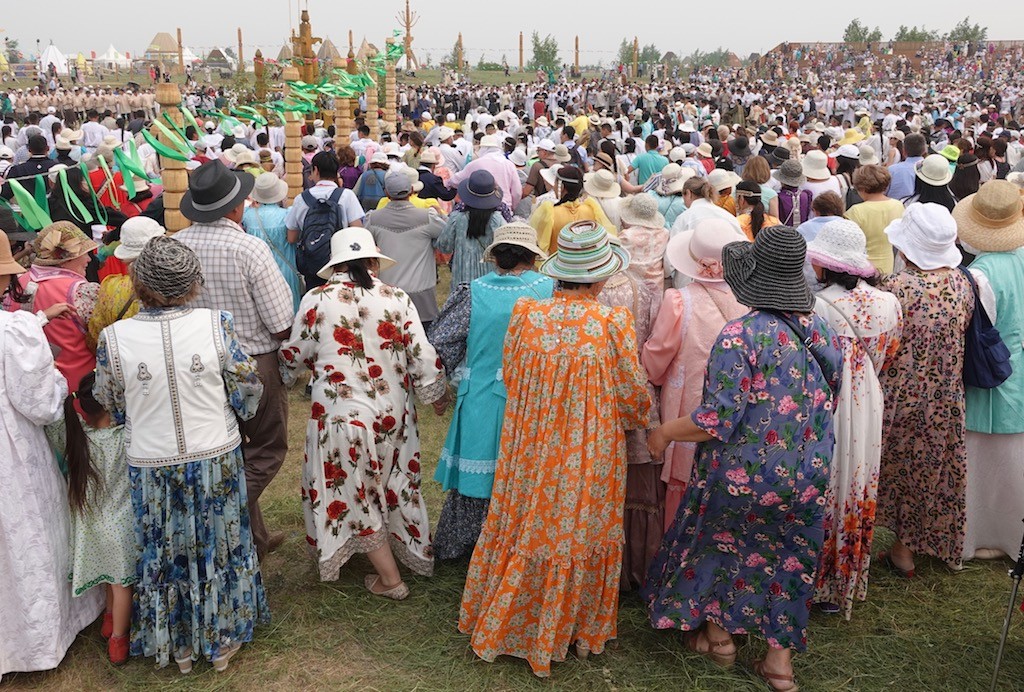
Osokhay dancing at Ysyakh festival
When it ended, the spectators were let loose, spilling onto the huge grassy plane, mixing with the dancers and forming several concentric rings by linking hands with one another. A booming voice began to chant in the Yakut language, as incomprehensible to Russian speakers as Native American tongues are to anglophones. The people forming the rings began to sidestep to their left and the rings began rotating clockwise around a tall wooden serge, a sacred and traditionally carved horse-tethering pole with a choron on top. This was the ancient spectacle of the Osokhay dance, which I had witnessed and taken part in many times before but never on this scale.
I began photographing but was quickly driven backwards by floods of people pouring in to join the Osokhay. Concentric rings of human beings rapidly spread outwards until I was at least fifty meres back from where I had previously been standing. By now there were around 15,000 people dancing the Osokhay. The concentric rings were so tightly packed together that one had the impression of a single gigantic wheel rotating on an axis formed by the central serge. Unable to take any meaningful photos of something on this scale, I put my camera away and joined in.
After the Osokhay we joined the crowds of people perusing kiosks, cafes and food stands offering traditional Yakut delights such as stuffed perch, olyadushki pancakes and skewers of barbecued horse meat. We wandered the grounds, observing a multitude of traditional dances, sporting events, concerts and rituals and passing hundreds of tents, pavilions, stages, log cabins, enclosures and traditional indigenous dwellings, many with their own mini-festival taking place inside.
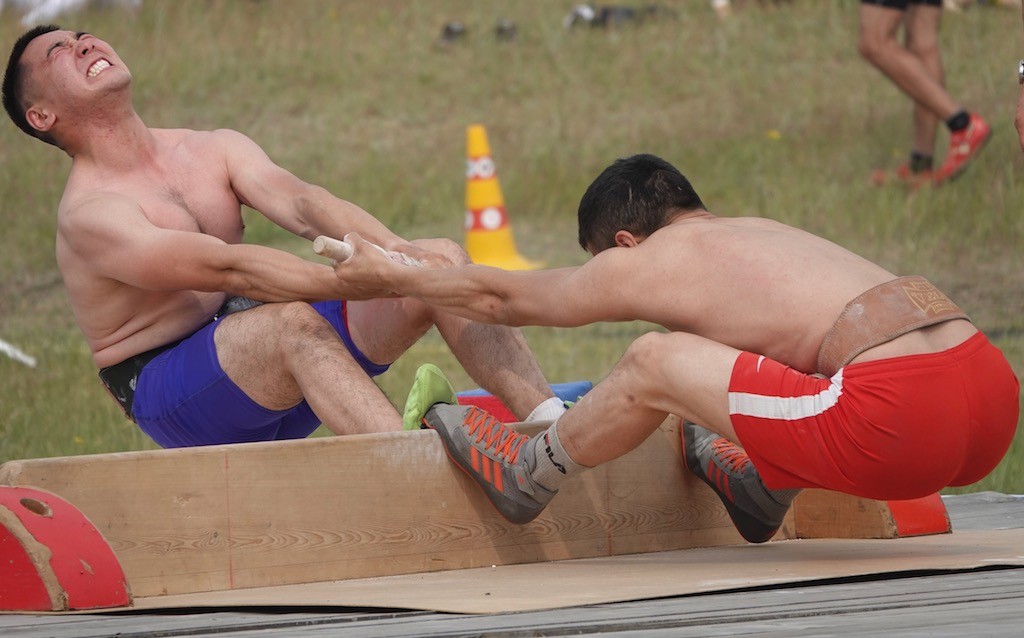
Mas wrestling, a favorite Yakutian sport, at Ysyakh festival
The grounds were absolutely enormous and it took at least twenty minutes to walk from one side to the other even if you were not stopping anywhere on the way. There were very few signs or maps and of course absolutely no information in English. If planning a visit it is definitely worth finding out in advance what you want to see and where it will be taking place. Likewise it is worth having a space where you can go to sit down, relax and get away from it all every now and then, whether this be a tent or a car. A car of course has the advantages that a) you can bring way more stuff with you and b) you can do what we did around 3pm – make the long trek back to your vehicle and sit down with the AC on to escape from the heat and dust for a while. You can also use it to store several 5-litre bottles of water both for drinking and for washing the dust off your skin.
By 6pm we were back at the festival to watch one of the main events of the day: the horse racing. Unlike at such events back home in England there was no Tote, no endless row of bookies calling out near-identical odds and no beer tent (the whole of Ysyakh is alcohol-free, so bring your own if it will be required). The only way to place bets was through privateers. In our part of the crowd this meant a pair of sly old ladies who constantly made the rounds through the spectators asking if anyone fancied a flutter on the next race.
The trouble was that there were no odds, and when I asked them what the odds were on a certain horse they did not even understand the Russian word for «odds», looking at me as if I was barking mad. Instead you just chose a horse, bet 500 rubles on it and if your horse came first then you won all the money in the pot.
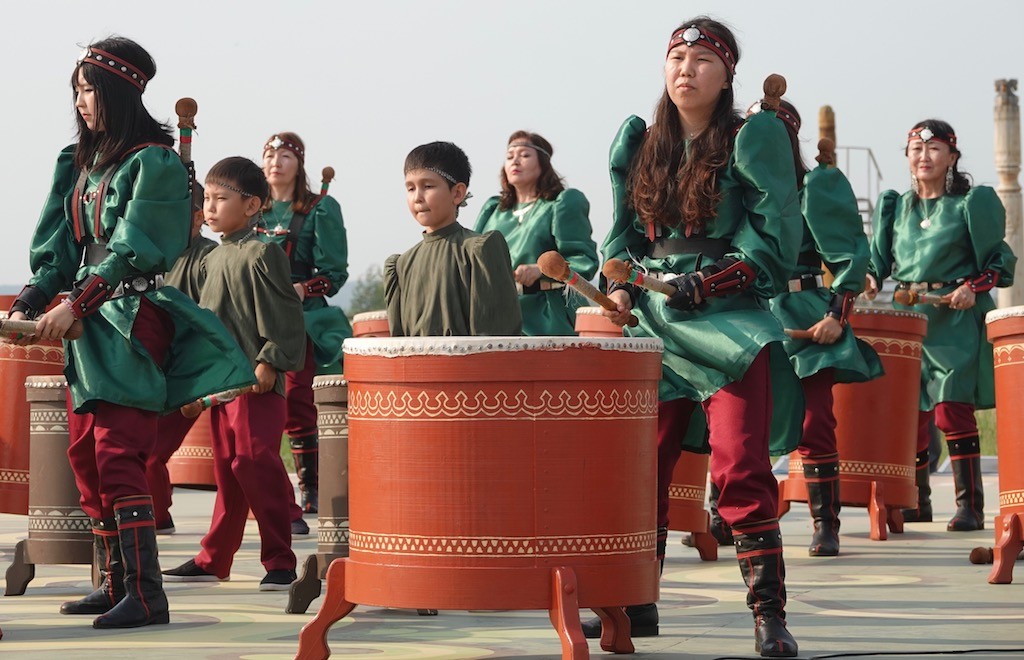
Musical performance before the horse racing at Ysyakh festival
«I’ll bet on Ataman then,» I said, offering them 500 rubles, having liked Ataman’s description, appearance and name, which means something like a warlord among the fierce Cossack people of southern Russia who had been the first to invade Siberia from Russia back in the 16th Century.
«Ataman’s taken, I’m afraid,» one of the women promptly replied. «The only one left is Wet Chicken,» she apologized. I fail to recall the actual name of the horse she was proposing, but it was something that inspired a similar level of confidence to «Wet Chicken». I went along just for fun, although with hindsight it was easy to see how their scheme worked – they knew the horses well, took bets only on the ones that had no chance of winning and claimed that the favorite was already taken by another better. As there were no bookies or official odds, anyone who did not know the horses well could potentially be convinced into betting on a no-hoper.
Predictably, Wet Chicken limped in far behind all the other horses, almost having been lapped by the winner Ataman.
The horses in the last race galloped past the finish line at around 11pm, their dark figures outlined against a sky the color of molten metal. By now it was around +15C and very windy. Having not dressed appropriately for such weather we purchased some barbecued meat and went back to the car to feed, have a tipple and warm up before the main event – greeting the rising sun at 2am.
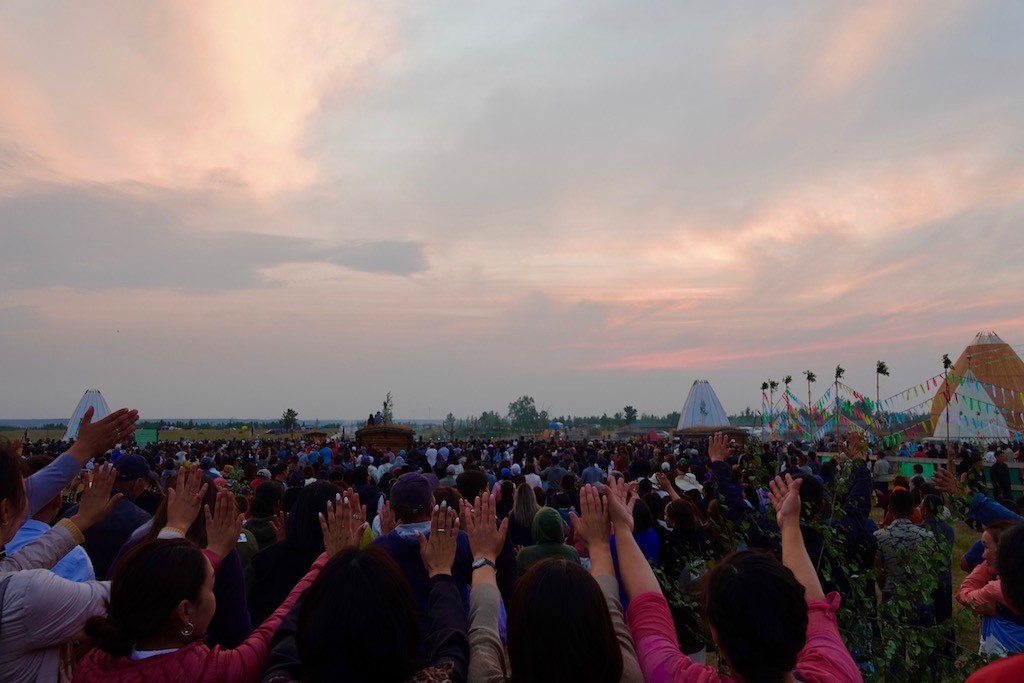
Greeting the rising sun at Ysyakh festival
Although it never gets dark at this time of year, Yakutsk is not in the Arctic so the sun does dip slightly below the horizon for a few hours in the middle of the night. In that twilight, the sky looking the way it does on most English summer afternoons, thousands of people stood on a hilltop next to a huge copper serge and waited.
Glowing red streaks slowly spread across the sky around the outlines of clouds in the east. People began to raise their arms with palms facing outwards to soak up solar energy, building up reserves for the vitamin-D starvation of the long winter. Many also held their hands to the metal serge, absorbing energy it channeled to them. As a dim red ball arose, partly obscured by the thick clouds, anyone whose hands had been dangling at their side now lifted them to the heavens and held them there as the sun rose higher.
At some point a booming voice called everyone down the hill to a level area for Osokhay, the sacred Yakut dance of people holding hands in a ring like the sun. As during the festival’s opening ceremony earlier that day, there were so many dancers that a huge number of concentric rings were formed, rotating like a wheel as the booming voice improvised a almost monotone chant in the Yakut language to which the Osokhay dancers sang along.
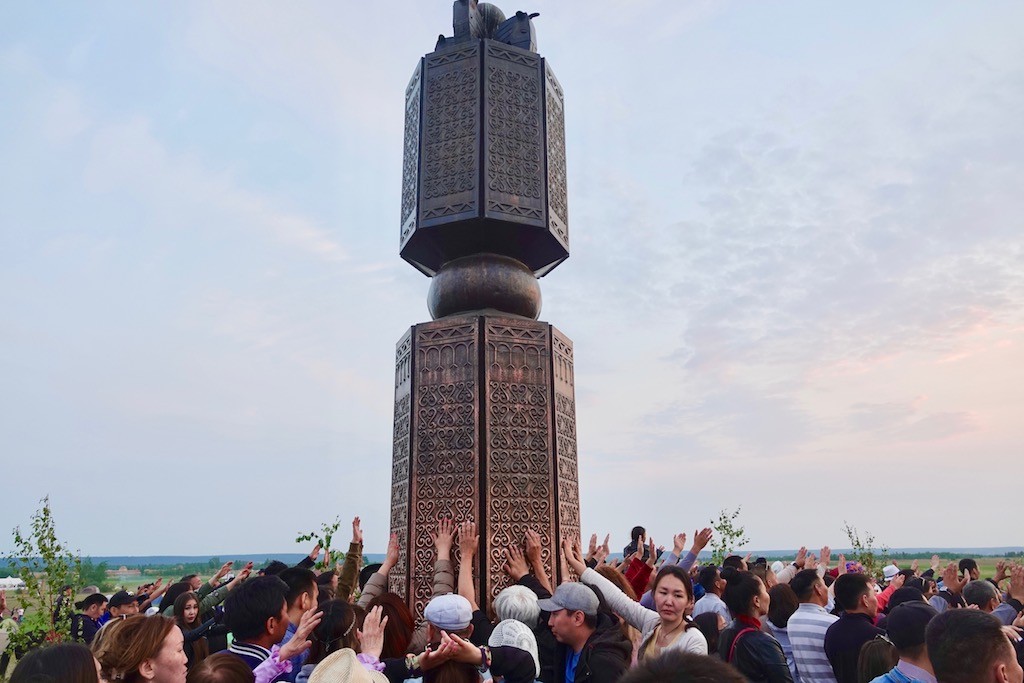
Greeting the rising sun at Ysyakh festival
There was something incredibly touching about seeing vast numbers of people showing such appreciation for things taken for granted in so much of the world: warmth, summer and the sun.
Around 4:30am we headed back to the car for a few hours sleep on the reclining front seats before heading back to the festival in the morning. We wandered around for an hour or so before sitting down to watch the sporting competitions – running, archery, wrestling and so on. But a lack of sleep, combined with the fact that most of what we were seeing today were less impressive repetitions of events we had seen on the first day, made me want to head for home.
Many of the unique and extraordinary things I saw and experienced on the first day of Ysyakh left such impressions that I will never forget them. If we had had a decent tent to sleep in I would have happily stayed until the evening on Day Two, but in the end sleep deprivation won out and we left at around 4pm.
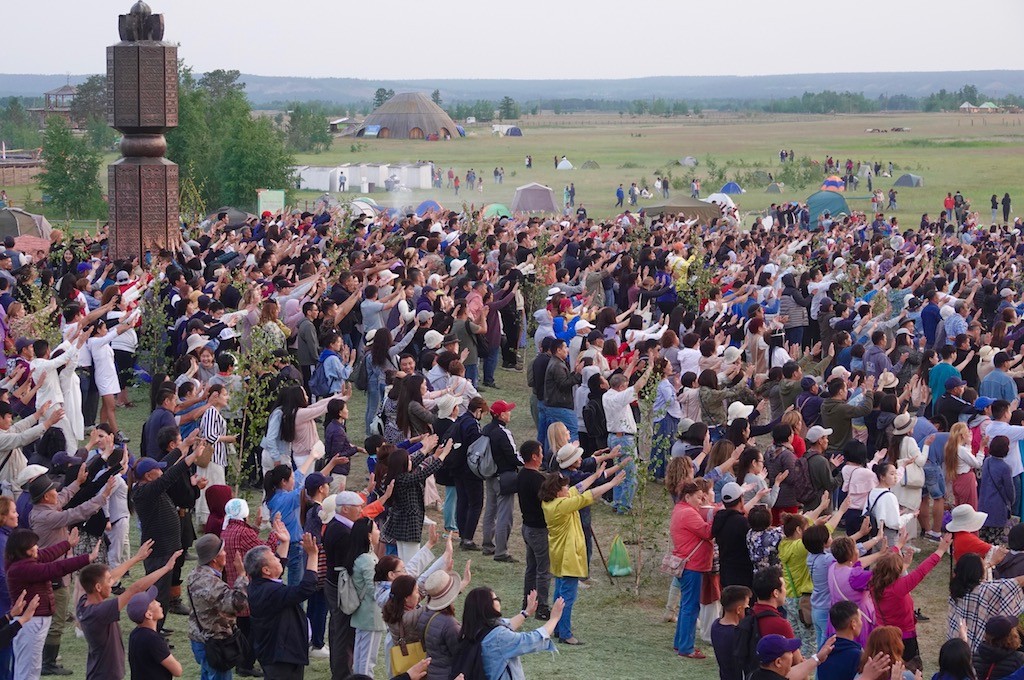
Greeting the rising sun at Ysyakh festival
When: A weekend after the 20th June
Where: Us-Khatyn near Yakutsk
Price: Free entry
Getting there and away: Regular buses from Yakutsk depart to the festival and cost 45 rubles (2019). They have Ysyakh (Ысыах) written on a sign in their windows. They are old, horrendously overcrowded and not air conditioned. Having to spend 2+ hours standing in one of these in +30sC heat might not be to everyone’s taste. Taxis are a good alternative, although they are likely to hike their prices up to around 2000 rubles due to congestion on the way to the festival. Uber works in Yakutsk, as do InDriver and Yandex Taxi. Alternatively you can hire a car, as we did, for 2000 – 2500 rubles per day, although you will need Russian language skills and the patience to phone around multiple rental agencies who will not give you a definite answer until the last minute.
What to bring: Even if only staying until the greeting of the sun, a tent is a good idea as it gives you somewhere to relax, catch 40 winks and generally escape from it all every now and then. A car and a tent is the ideal combo, as the car means you have AC during the day, which can be extremely hot. A good supply of water for washing of dust is a good idea, plus potentially insect repellant in case there are lots of mosquitoes. If you do not have a car you should have a Russia SIM card to be able to use taxi apps and a translator app to be able to ask people the way to events at the festival. If staying the night, ear plugs would be great plus a sleep mask, as it does not get dark at night.
Not to miss: The opening ceremony, the sporting events, the horse racing and the greeting of the sun.
Posted in Blog